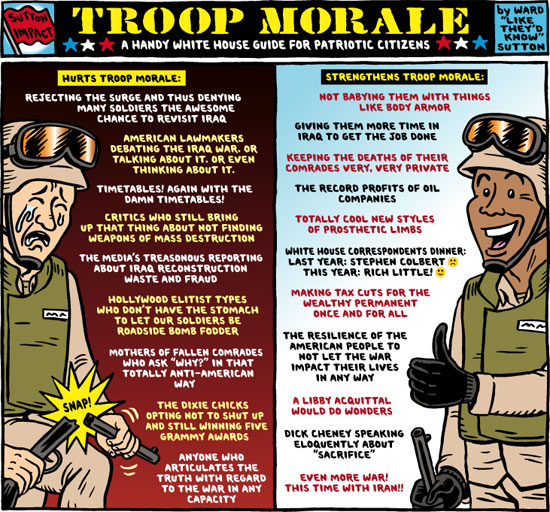Military Morale and the War of Words
 Bruce McQuain cites the opinion of Marine Corps Cpl. David Goldich as further evidence of his own belief that negative commentary about the war by politicians, pundits, and retired generals hurts the morale of soldiers fighting the war.
Bruce McQuain cites the opinion of Marine Corps Cpl. David Goldich as further evidence of his own belief that negative commentary about the war by politicians, pundits, and retired generals hurts the morale of soldiers fighting the war.
My own experience, as I’ve noted previously (see, for example, my December 2005 TCS piece “Does Criticism of the War Undermine Troop Morale?“) runs counter to Goldich’s. Simply put, soldiers engaged in the war tend to have only the most vague sense of what’s happening outside their fields of fire.
But let’s suppose, for the sake of argument, that Goldich is right.
So what?
While we obviously don’t want to make the conditions for those we’ve ordered into harm’s way even more arduous, surely we don’t want to sacrifice our most fundamental rights. Whether or not “healthy debate” harms troop morale, it’s still vital to democratic governance, right?
The alternative thesis would seem to be that, once we’ve started a military engagement, no dissent from the president’s policy decisions is permissible. Presumably, that would even extend to election season, right? After all, there’s no time when dissent would get more media attention. So political candidates would be required to pretend that we’re not at war or that any extant policy is therefore peachy keen and we should absolutely “stay the course” so that we might “support the troops”?
Isn’t that paying too high a price to avoid hurt feelings?
Image source: Village Voice via Google Images.






It’s one thing to have “healthy debate” but it’s another thing altogether to have so called “leaders” of this country calling our troops “cold-blooded murderers” as Murtha did, or to imply that we ruthlessly raid innocent civilian homes in the dead of night, as Kerry did. Or even to declare the war is lost as Reid did and to imply that we can’t win on the battlefield.
If you read Cpl. Goldich’s comments carefully, you will see that this is what he is against. And I don’t blame him either. This country is blessed with men and women who voluntarily put their lives on the line to fight our wars, whether those wars are right or wrong. Yet we have fat-assed, corrupt, hypocritical politicians whose idea of “healthy debate” is to tell slanderous lies about these very same warriors.
Yes, the USA is singular in all history in that we’ve never had any issues with our troops even coming close to crossing the line. And our troops are so sensitive to this obvious truth that even suggesting that the facts state otherwise is like kicking them in the balls.
Geebus.
I think the “so what” should first be a internal filter for the speaker. They should mentally ask themselves if the potential good they are doing speaking out is worth the potential harm from speaking out.
The second is the same test that we voters/consumers should apply. If a politician is scoring political points without consideration of the potential harm, I personally would want to see that politician not win the next election.
Of course the problem is that as we weigh this, we will each likely come out with a different result. I personally would have been much more impressed if the democrats had been putting forward suggestions on how to better win the war in Iraq (preferably those that involve more future orientation than hindsight nit picking) than there waffling between supporting the war when it started and was popular to trying to find a way to surrender when the going got rough. And if they really felt running away would be the best, then some acknowledgment of the likely outcome of such a decision would have been nice.
The 1864 democratic presidential platform could have been used almost word for word by the democrats in 2004 or 2006 (and probably 2008 except they seem to have bought a clue about the success of the surge). Wouldn’t this be such a different country is we had taken their advice back then.
Mr Joyner,
Doesn’t it get lonely being (nearly) the only voice of sanity on the right? I mean here you are being forthright and honest and you can only expect to get savaged by your fellow travelers for not being a xenophobic tyrant.
I imagine that must suck, but I appreciate it.
PTM:
What if those statements are true, or atleast a colorable argument can be made for them (and indeed, yes, a solid argument can be made for each when you consider the deaths during interrogations, the overzealous attacks on civilians, the murders in Haditha, and so on)? Are people supposed to shy away from the truth because it hurts your feelings?
Slanderous lies like Pat Tillman being killed by enemy fire? Oh, no, that was a lie by the army that had to be uncovered. Slanderous lies like the rape and murder of 14 year old Abeer Qassim Hamza al-Janabi as well as he family by US troops? Oh wait that turned out to be true.
YAJ:
I’d be pretty impressed with suggestions of how to do the impossible too, but that’s kind of a high standard you want to hold the dems to…
“The alternative thesis would seem to be that, once we’ve started a military engagement, no dissent from the president’s policy decisions is permissible”
The “alternative thesis”? You mean the standard right-wing line that we have heard every day for the last 5 years!
I agree with Tlaloc. Kudos to James for having the sense to understand what American freedom is all about. But it underlines the question – why is this so rare on the right?
Criticizing the content of someone’s negative commentary regarding war policy is fair game, obviously. But criticizing the fact of the negative commentary should be universally rejected as contrary to what this nation is all about.
If the fact of the commentary upsets some people, even the troops, well that is just the price we pay for freedom.
Listen, its time the troops started getting the job done. Bush has said numerous times that he has given the commanders on the ground all they asked for, yet they are coming up short.
It is similar to a baseball team–the GM gives the manager the players needed to succeed. When they don’t the manager and/or the players are replaced with people who can win–just ask Joe Torre.
Bush needs to act more like the CEO he purports to be and demand performance from his underlings–the troops.
Triumph,
That’s a wonderful idea! But why wait for the president to do it? You should go down to the nearest Army post and tell a bunch of those “underlings” that they just need to suck it up and do better! As a matter of fact, you should go with them on their next 15 month deployment and show them how it’s done! After all, war, baseball, it’s the same thing, right? No sweat! Men of your obvious courage truly inspire me.
Be sure to tell us how it turns out.
It is hard not to say hard things about a war we were tricked into with outright lies and embellished intelligence. I feel badly for those in harm’s way as a result. However, our future depends on learning from this experience and responding in such a way that the next time a criminal element manages to worm its way into the White House, the ability to wage aggressive war won’t be in their tool kit. Fool us once (Johnson, the phony Tonkin Incident, the War Powers Act) it’s on you. Fool us twice (Bush, WMD, Al-Quaeda Saddam connection, the War Powers Act) shame on us.
Our military is comprised of very sharp people. They realize that freedom of speech is one of the rights that motivated them to sign up.
My father was a Navy veteran in the 40s, 50s & 60s. He was aware that the Korean and Vietnam wars weren’t popular. However, he considered himself a volunteer and a professional.
At 20 years of service, he decided not to reenlist, although he had the papers in front of him for a senior chief slot. He felt 20 years was enough and it was time for someone else to step up. I never thought he was demoralized by the talk of the war. It was the length and the objectives that he had problems with. The necessity of the draft bothered him. He preferred to serve with volunteers.
Draftees don’t want to be there. If we go to a draft, we will have a serious morale problem.
As a society, it’s our responsibility to question the war and make our civilian leaders prove that the war is worth the cost in lives and dollars. Cutting our losses might be the best possible scenario. It needs to be discussed.
Sun Tzu in the Art of War said that no country has benefited from a prolonged war. Paraphrasing, a long war dulls your swords, drains your treasury, and demoralizes your warriors.
We need to identify an objective, win it, and bring our warriors home. Soon.